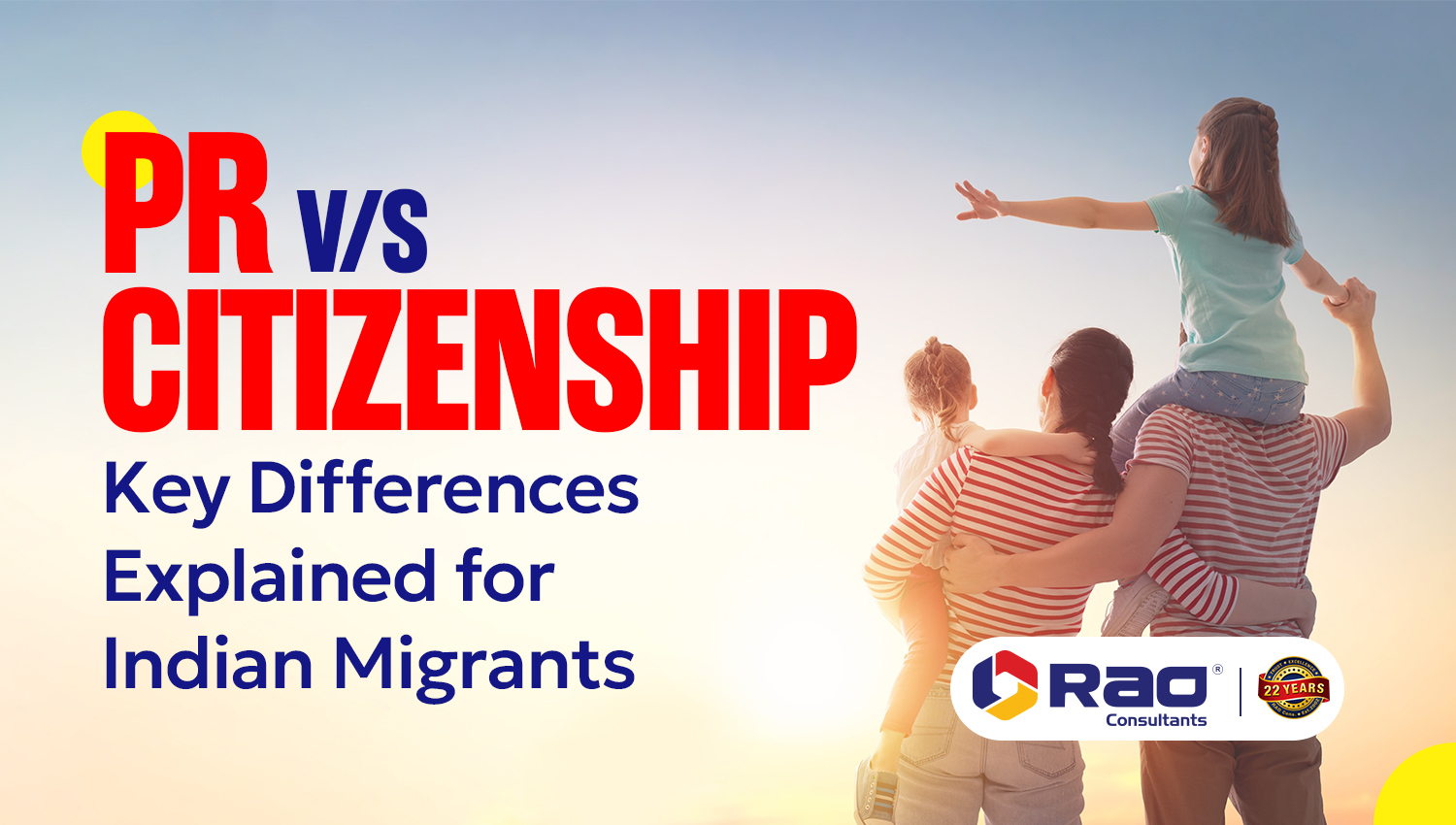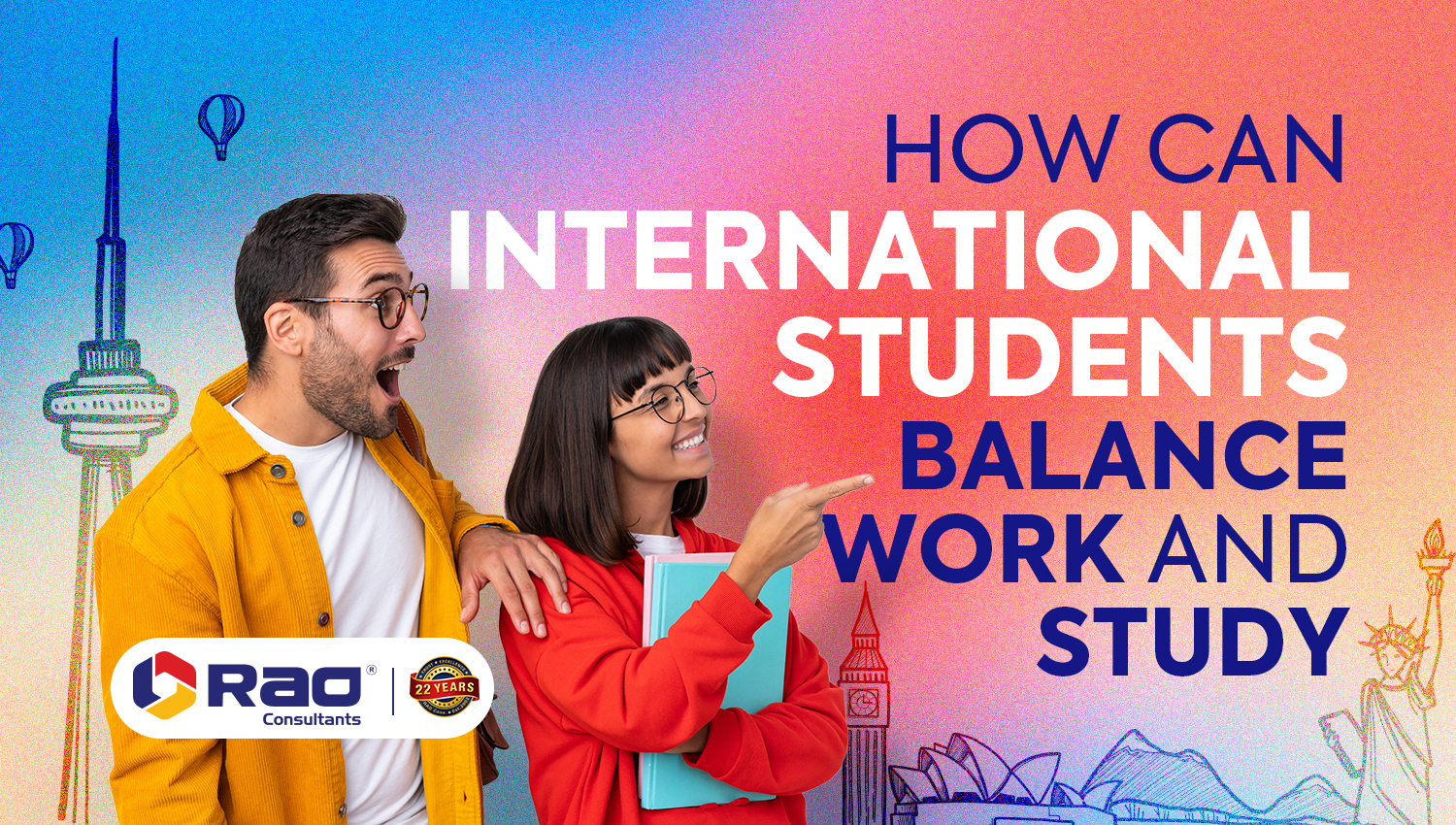
Rao Consultants
May 9, 2025
PR vs Citizenship: Key Differences Explained for Indian Migrants
Many Indians who want to live abroad start their trip by asking themselves, “How do I make a foreign country my long-term home?” Although obtaining a visa is the initial stage, most people’s true objectives go beyond a brief visit; they include security, stability, and a future overseas.
Citizenship and Permanent Residency (PR) Visa are two options frequently taken into consideration for long-term settlement. Despite their occasional interchangeability, these names have quite distinct connotations, rights, and obligations.
We explore the main distinctions between Citizenship and Permanent Residency Visa in this extensive guide, as well as why they are important, how they affect your future overseas, and what Indian nationals should specifically think about before making a decision.
What is Permanent Residency?
Foreign nationals who are given permanent residency are able to live, work, and frequently study in a country for an extended period of time without obtaining citizenship. A temporary visa and full citizenship are frequently viewed as being in the middle of each other.
Common Characteristics of PR:
- Right to Reside and Work: People with permanent residence permits are eligible to live and work in the nation for as long as they choose.
- Social Benefits: Depending on the nation, social security, healthcare, and education are all accessible.
- Residency Conditions: A minimum number of days must be spent in the nation annually for PR holders to remain in some countries.
- Renewal Requirements: PR often has to be renewed every few years. Status can be lost if requirements are not met.
- No Voting Rights: Generally speaking, PR holders are not allowed to cast ballots or run for public office.
- No Passport Issuance: Having a passport from the host nation does not confer PR status.
Popular PR Systems:
- Canada: Express Entry, Provincial Nominee Programs (PNPs).
- Australia: Australia PR, Skilled Independent visa (subclass 189), Employer Nomination Scheme.
- Germany: EU Blue Card holders can apply for PR after 33 months (or 21 months with language proficiency).
What is Citizenship?
The legal status of citizenship, which is bestowed by a nation, denotes complete membership and entails all the rights and obligations of a citizen who was born there.
Common Characteristics of Citizenship:
- Full Political Rights: The ability to run for public office and cast a ballot in every election.
- Unrestricted Work Rights: Access to all jobs, including those in the public and security sectors.
- National Passport: The nation issues passports to its citizens, which allow them to enter numerous other nations without a visa or with one upon arrival.
- Consular Protection: The entitlement to support from the nation’s overseas embassies and consulates.
- Deportation Protection: Generally, citizens are not subject to deportation.
- No Renewal: Unless acquired unlawfully or under extremely specific circumstances, citizenship is often permanent.
How Citizenship is Acquired:
- By Birth: Being born in a country (jus soli) or to citizens (jus sanguinis).
- By Naturalization: After a period of PR, individuals can apply for citizenship.
- By Marriage: Some countries offer faster routes through marriage to a citizen.
Major Differences at a Glance
|
Feature |
Permanent Residency | Citizenship |
| Legal Status | Non-citizen resident |
Full citizen |
|
Passport |
No | Yes |
| Voting Rights | No |
Yes |
|
Work Rights |
Limited (some government roles restricted) | Full access |
| Renewal Required | Yes (in most cases) |
No |
|
Deportation Risk |
Yes (in legal violations) | No (except in exceptional cases) |
| Family Sponsorship | Limited |
Broader rights |
|
Social Benefits |
Most benefits, not all | All benefits |
| Residency Requirement | Must reside certain days/year |
None |
Pathway from PR to Citizenship
Many countries view PR as a stepping stone to citizenship. Here’s how the process typically works in some popular destinations:
Canada:
- PR Duration Required: 3 out of 5 years (1,095 days).
- Other Criteria: Pass a citizenship test, prove language proficiency (English or French), file taxes.
Australia:
- PR Duration Required: 1 year as a PR within a 4-year lawful stay.
- Other Criteria: Good character, basic knowledge of Australia, intention to reside.
United States:
- PR Duration Required: 5 years (3 years if married to a U.S. citizen).
- Other Criteria: Physical presence, continuous residence, pass civics and English tests.
United Kingdom:
- PR Duration Required: Must have ILR (Indefinite Leave to Remain) for at least 12 months.
- Other Criteria: Life in the UK Test, English language requirements.
Special Considerations for Indian Nationals
Dual Citizenship
Dual citizenship in the conventional sense is not permitted in India. An Indian citizen must give up their Indian passport if they obtain citizenship in another country. They can, however, apply for Overseas Citizenship of India (OCI), which grants them lifetime visa-free access to India along with a number of other advantages, but it does not provide them political rights.
Tax Implications
Your worldwide tax responsibilities may change if you become a citizen instead of a PR. Seeking advice from a financial counselor is essential:
- For instance, US residents pay taxes on their international income.
- Significant tax filing requirements apply in Canada and Australia as well, particularly if assets are kept abroad.
Emotional and Cultural Considerations
It might be emotionally taxing to relinquish Indian citizenship. Many experience a loss of national identity, despite the fact that OCI provides a bridge. Some people would rather keep their PRs for as long as possible because of this.
PR vs. Citizenship: Which One Should You Choose?
Choose PR If:
- You want to keep your Indian citizenship while living and working in the nation.
- You’re not sure if you want to settle down for good.
- You desire adaptability without severing your connection to India.
Choose Citizenship If:
- You desire complete rights and intend to settle down forever.
- You want more worldwide mobility and a more robust passport.
- You wish to take advantage of all the perks or sponsor more family members.
- You’re prepared to give up your Indian citizenship.
Conclusion
Understanding the distinction between citizenship and permanent residency is crucial for Indians getting ready to go abroad. Permanent residency (PR) offers flexibility and substantial benefits without compromising Indian nationality, whereas citizenship confers full rights at the cost of relinquishing your Indian passport. Depending on your long-term goals, each has benefits.
Whether you want to start a global career, settle down with your family, or simply explore opportunities overseas, deciding on your immigration status is a crucial decision. Make an informed choice by considering your lifestyle needs, legal repercussions, and personal tie to India.
Speak with reputable visa specialists that can help you at every stage if you need professional guidance on immigration, permanent residence, and citizenship routes.
Share onYou May Also Like

How to Choose the Right Entrance Exam for Study Abroad ?
Studying abroad is a dream for many Indian students, but it often requires a critical step: passing the right entrance exams. Just like you need a ticket to board a flight, these exams are your entry pass into foreign universities. Whether it’s to prove your English language skills or to showcase your academic excellence, entrance […]
Read More
How Can International Students Balance Part-Time Work and Study?
Studying abroad is a dream come true for many students. when you’re juggling part-time work and study then it’s enriching, exciting, and at times, a little overwhelming. Sounds like walking a tightrope, doesn’t it? For many international students, working part-time isn’t just a choice; it’s a necessity. But how do you keep your grades up […]
Read More
Top Part-Time Jobs for International Students in Ireland
Are you planning to study in Ireland and wondering how to manage your expenses? You’re not alone. Thousands of international students ask the same question each year. The good news? Ireland offers plenty of part time job opportunities that can help ease your financial load—and even boost your resume. Think of it like riding a […]
Read More